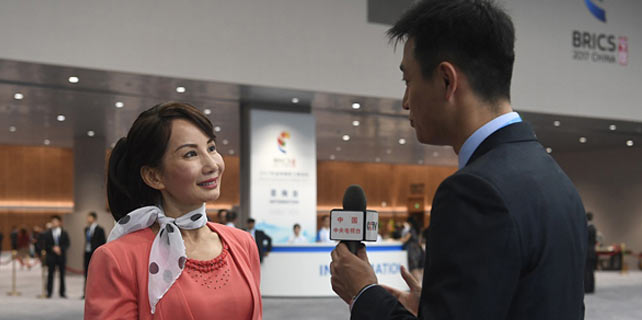Growth Lessons

Peking University institute helps promising leaders from developing countries understand and analyze China's development experience
In a September 2015 speech at United Nations headquarters in New York, President Xi Jinping announced a series of programs that China would make available to other developing countries, including projects in poverty reduction, agricultural cooperation, trade promotion, environmental protection, health and education. In addition, during the speech to the High-Level Roundtable on South-South Cooperation, he announced the creation of a venue for the international study of economic development.
"China will also set up an academy of South-South cooperation and development," Xi said.
Yao Yang, a professor of economics at the National School of Development of Peking University, says his school was honored to jump into action after Xi's speech. The Institute for South-South Cooperation and Development, an English-language graduate school at the university, was established to give promising leaders from developing countries the opportunity to learn about, and analyze in depth, China's economic development experience.
Yao, who is now executive dean of the institute, says the school will concentrate on economic development, in contrast with Western organizations, such as Harvard University's Kennedy School of Government, that focus on international relations and government management. "We are going to focus on economic development, so economists are the backbone of our faculty. I think that is more pertinent for developing countries, where raising incomes is the most pressing issue."
Fu Jun, the institute's academic dean, emphasizes that developing countries are important to China's economic future. "To link different parts of the world together, you need to have connections at the physical dimensions, at the economic institution dimension, and also at the dimension of ideas. This program is at the dimension of ideas, the exchange of ideas, and people-to-people contact. That is what we are doing here," he says.
The great debate
Fu kicked off the Institute for South-South Cooperation and Development's second year with a discussion of a key issue that permeates the curriculum: How do you find the correct balance between the state and the market?
He starts from first principles: "Why do we need to have a state? When you read Adam Smith's The Wealth of Nations, there are hundreds of pages in that book on the role of the state. Serious economists argue that the market is efficient. They never claim that it is perfect. So the implicit message is that markets themselves cannot work without institutions. Where do we draw the line between the market and the state?"
Yao argues that the institute offers a unique opportunity for students to analyze China's development model. "Our faculty has a unique combination of knowledge. All are trained in the US or other countries. In the meantime, we know China well. We have studied China for our lifetime, so we have a good combination. We believe that the Chinese experience is pertinent for other developing countries. But don't take me wrong. We don't want students to copy the Chinese experience.
"I teach a course in the political economy of economic development in China. The first thing I tell them is that I'm going to talk about China. I have no knowledge about your countries. You are going to see China as a mirror of your own country, and you are going to decide which part of the Chinese experience is useful for your own country," Yao says.
This echoes President Xi's comments at the South-South Roundtable, when the president said: "The first (proposal) is to explore diversified paths of development. A matching key is required to open the lock. The developing countries should stick to the development paths of their independent choice and with their unique characteristics, share successful experience in governance and administration of state affairs, focus on capacity-building, explore growth potential, solve development difficulties and improve the well-being of the people."
Yao emphasizes the quality of debates at the school: "We have a spectrum of faculty from the ultraright to the ultra-left. We have professors at each point. Most of the professors work on economics, which does not have any ideological implications. Students can listen to all sorts of voices and opinions - that is their choice, whether they are going to choose market-oriented or government-oriented policies."
The institute's curriculum covers four cross-cutting policy domains - development and poverty reduction; innovation and education; population and health; and climate change and the environment. Courses on leadership aim to give the students intellectual leadership skills and the managerial skills needed to run public organizations. A course in microeconomics is required so each student will be able to analyze incentive structures. Courses in macroeconomics and the role of the state are also required, giving students the tools needed to assess the right balance between the state and the market.
On top of this, students conduct field studies in rural areas, special economic zones, coastal cities and interior parts of China. For example, they visit Xiaogang village in Anhui province, where a group of villagers started China's reforms by secretly agreeing to divide their collective farm into private plots. The students are asked to analyze the risks and incentives faced by the villagers.
World voices
The Institute for South-South Cooperation and Development's students come from 23 developing countries in Africa, Latin America, Asia and Europe. They all work in the public sector or nonprofits. Many are idealistic, dreaming of changing their countries with the knowledge learned in China.
Several students plan to tie their experiences at the institute with future work related to the Belt and Road Initiative or the Asian Infrastructure Investment Bank.
Nasser Alsahqsi, from Oman, says: "We in the Middle East are depending on oil and gas, but they will vanish someday. What I want to take back is how China survived without what we have in terms of raw materials. I really want to reform the backward philosophy of my country. We need to open up for foreign direct investments. We are opening up some now, but it's more like we are afraid to take that step. Chinese companies are opening up some industrial zones back in my country. This fits into what they are planning now in the Belt and Road Initiative. From the sea, shipments come directly to Oman, and that is very good for Oman."
Yousaf Malik was sent to the institute by his employer, the secretariat for the China-Pakistan Economic Corridor in the Pakistan Ministry of Planning and Industrial Reform. His agency is responsible for dealing with China's National Development and Reform Commission and with Chinese companies that invest in Pakistan. He says that Chinese loans to his country are effective because they give the money in progress payments directly to the company that wins the tender. "The IMF gives money to the government directly, and much of it goes into corruption.
Kamila Sitchanova, from Kazakhstan, says that in 2015 her country adopted a strategy similar to the Belt and Road Initiative. She works in the international cooperation division of the State Revenue Committee and focuses on cooperation between Kazakh and Chinese customs. China is sponsoring her department's efforts to set up automatic checkpoints along all of her country's borders.
Thandanani Wah Ziqubu, a 27-year-old from South Africa, has worked for the Department of Economic Development, Tourism and Environmental Affairs and is a member of the Communist Party of South Africa. He has had trouble finding jobs because South Africa's unemployment rate now stands at 27.7 percent and is much worse among the young.
"In South Africa, we are moving toward being a developmental state, and that can't happen unless the people are conscious that they can do whatever in this country, just as long as it's within the law. And you can do whatever economic activity as long as it is going to bring about positive economic change to the country. In China, the Communist Party gives the people more room to be actors because it is one with the people," he says.
He also emphasizes the opportunities for all to contribute in China. "The culture and the education they receive promote that culture of working and of participation from each and every person. The economy of China is so great and South Africa can be like that. The culture of a working people is instilled in the people. In the next 50 years, we can also see ourselves in a very, very favorable position within the global economy.
"To me, economics is the most valuable part of our curriculum. You are looking at the world, but from the Chinese perspective.
davidblair@chinadaily.com.cn









